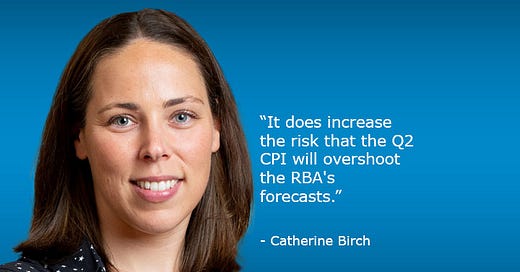There’s a headache for the RBA after Australia’s CPI indicator rose more than expected in May. And the Yen weakened overnight through 160 to the US dollar, to its lowest level since 1986.
In our bonus deep dive interview, ANZ Chief Economist for Greater China Raymond Yeung analyses recent ‘de-dollarisation.’
5 things to know:
US Treasury yields rose overnight ahead of bond auctions and French elections. Stocks were broadly flat. The Aussie dollar was up 0.18% at 66.57 US cents following stronger-than-expected annual inflation of 4% in May. ANZ Senior Economist Catherine Birch sees signs non-tradable disinflation stalled and services inflation picked up.
Catherine says the result could make the Reserve Bank of Australia a little nervous, with a risk Q2 CPI will overshoot the central bank’s forecast.
Ahead of the CPI data, RBA Assistant Governor Christopher Kent reiterated the central bank’s view that monetary policy was restrictive in a speech.
The Yen weakened to 160.62 to the US dollar, its lowest since 1986. Authorities noted concern with the “rapid weakening” and threatened action against “excessive movements”. ANZ FX Analyst Felix Ryan says all eyes are now on US PCE inflation data due on Friday.
The Philippines central bank is expected to keep its main policy rate on hold at 6.5% today. ANZ Economist Arindam Chakraborty says inflation has risen for four months in a row to near the top of the BSP’s 2%-to-4% target band.
Cheers
Alex (standing in for Bernard, who’s on a mid-winter break this week)
PS: Catch you tomorrow with part 2 of Raymond’s interview on China’s push for greater monetary independence.












